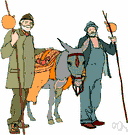vagrant
(redirected from Vagrants)Also found in: Thesaurus, Medical, Legal, Encyclopedia.
va·grant
(vā′grənt)n.
1.
a. One who wanders from place to place without a permanent home or a means of livelihood.
b. Archaic A wanderer; a rover.
2. One who lives on the streets or constitutes a public nuisance.
3. An animal occurring beyond its normal range; an accidental.
adj.
1. Wandering from place to place and lacking any means of support.
2. Living on the streets or constituting a public nuisance.
3. Inconstant or capricious; wayward: "She was resolved to win my vagrant fancy" (Frank Harris).
4. Moving in a random fashion; having no fixed direction or pattern: vagrant ice floes; a vagrant aroma.
5. Being beyond its normal range; accidental. Used of animals.
[Middle English vagraunt, probably alteration of Old French wacrant, present participle of wacrer, to wander, of Germanic origin.]
va′grant·ly adv.
American Heritage® Dictionary of the English Language, Fifth Edition. Copyright © 2016 by Houghton Mifflin Harcourt Publishing Company. Published by Houghton Mifflin Harcourt Publishing Company. All rights reserved.
vagrant
(ˈveɪɡrənt)n
1. a person of no settled abode, income, or job; tramp
2. (Zoology) a migratory animal that is off course
adj
Archaic equivalent: vagrom 3. wandering about; nomadic
4. of, relating to, or characteristic of a vagrant or vagabond
5. moving in an erratic fashion, without aim or purpose; wayward
6. (Botany) (of plants) showing uncontrolled or straggling growth
[C15: probably from Old French waucrant (from wancrer to roam, of Germanic origin), but also influenced by Old French vagant vagabond, from Latin vagārī to wander]
ˈvagrantly adv
ˈvagrantness n
Collins English Dictionary – Complete and Unabridged, 12th Edition 2014 © HarperCollins Publishers 1991, 1994, 1998, 2000, 2003, 2006, 2007, 2009, 2011, 2014
va•grant
(ˈveɪ grənt)n.
1. a person who wanders about idly and has no permanent home or employment; vagabond.
2. Law. an idle person without visible means of support, as a tramp or beggar.
3. a person who wanders from place to place; wanderer; rover.
adj. 4. wandering or roaming from place to place.
5. of or characteristic of a vagrant.
6. wandering idly without a permanent home or employment: vagrant beggars.
7. (of plants) straggling in growth.
8. not fixed or settled, esp. in course: a vagrant leaf blown by the wind.
[1400–50; late Middle English vagaraunt, appar. present participle of Anglo-French *vagrer, perhaps < Middle English *vagren, b. vagen (< Latin vagārī to wander) and *walcren (> Old French wa(u)crer), frequentative derivative of walk]
va′grant•ly, adv.
Random House Kernerman Webster's College Dictionary, © 2010 K Dictionaries Ltd. Copyright 2005, 1997, 1991 by Random House, Inc. All rights reserved.
ThesaurusAntonymsRelated WordsSynonymsLegend:
Switch to new thesaurus
| Noun | 1. |  vagrant - a wanderer who has no established residence or visible means of support vagrant - a wanderer who has no established residence or visible means of supportbeachcomber - a vagrant living on a beach have-not, poor person - a person with few or no possessions sundowner - a tramp who habitually arrives at sundown |
| Adj. | 1. |  vagrant - continually changing especially as from one abode or occupation to another; "a drifting double-dealer"; "the floating population"; "vagrant hippies of the sixties" vagrant - continually changing especially as from one abode or occupation to another; "a drifting double-dealer"; "the floating population"; "vagrant hippies of the sixties"unsettled - not settled or established; "an unsettled lifestyle" |
Based on WordNet 3.0, Farlex clipart collection. © 2003-2012 Princeton University, Farlex Inc.
vagrant
noun
adjective
Collins Thesaurus of the English Language – Complete and Unabridged 2nd Edition. 2002 © HarperCollins Publishers 1995, 2002
vagrant
adjectiveLeading the life of a person without a fixed domicile; moving from place to place:
The American Heritage® Roget's Thesaurus. Copyright © 2013, 2014 by Houghton Mifflin Harcourt Publishing Company. Published by Houghton Mifflin Harcourt Publishing Company. All rights reserved.
Translations
مُتَشَرِّد
-čkatulák
vagabond
flækingur
valkatavimas
bezpajumtnieksklaidonis
Collins Spanish Dictionary - Complete and Unabridged 8th Edition 2005 © William Collins Sons & Co. Ltd. 1971, 1988 © HarperCollins Publishers 1992, 1993, 1996, 1997, 2000, 2003, 2005
Collins English/French Electronic Resource. © HarperCollins Publishers 2005
vagrant
n → Landstreicher(in) m(f); (in town) → Stadtstreicher(in) m(f)
adj person → umherziehend; life → unstet, nomadenhaft
Collins German Dictionary – Complete and Unabridged 7th Edition 2005. © William Collins Sons & Co. Ltd. 1980 © HarperCollins Publishers 1991, 1997, 1999, 2004, 2005, 2007
vagrant
[ˈveɪgr/ənt] n → vagabondo/a, barbone/aCollins Italian Dictionary 1st Edition © HarperCollins Publishers 1995
vagrant
(ˈveigrənt) noun a person who has no fixed home; a tramp.
ˈvagrancy noun the state of being a vagrant. Vagrancy is a crime in some countries.
Kernerman English Multilingual Dictionary © 2006-2013 K Dictionaries Ltd.
vagrant
a. errante; suelto-a; libre.
English-Spanish Medical Dictionary © Farlex 2012